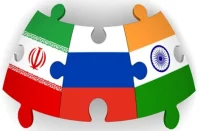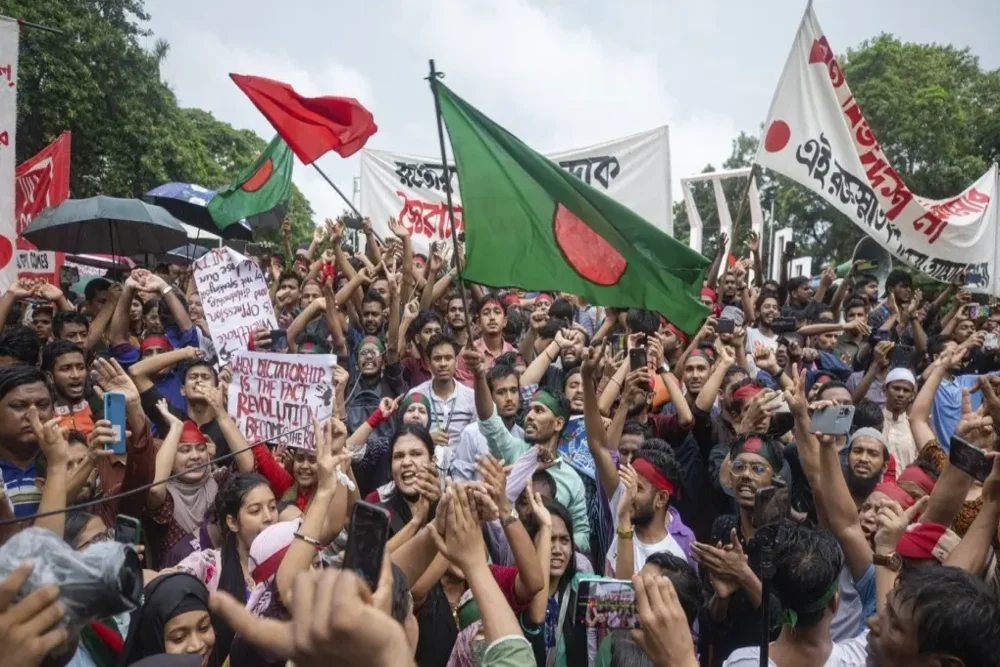The opposition seized parliament, the Prime Minister fled the country.
On Monday, August 5, the apogee of weeks of opposition protests came to Bangladesh, as a result of which the country‘s Prime Minister, Sheikh Hasina resigned and left the country. She flew by helicopter to India, later intending to apply for political asylum in the UK. Power passed to the military, who announced the formation of an interim government made up of representatives of all parties. The Chief of Staff of the Army, Lieutenant General Waker uz Zaman confirmed Hasina‘s resignation at a press conference and said that after discussions with representatives of the main political parties and civil society groups, it was decided to form an interim government.
“The Prime Minister has resigned. An interim government will be formed to govern the country… I give you my word that all the injustices will be addressed… The country has suffered a lot, the economy has been hit, many people have been killed — it is time to stop the violence.,” he said. It was also stated. that the previously imposed curfew will be lifted.
Significantly, there were no representatives from the ruling Awami League party at the first meeting.
The administration of President Mohammed Shahabuddin also released a statement saying that he had “unanimously decided to free” the imprisoned former Prime Minister and leader of the opposition Bangladesh Nationalist Party (BNP), Khaleda Zia, Hasina‘s archrival. Previously detained protesters will also be released from prisons.
Bangladesh Nationalist Party (BNP) Secretary General Mirza Fakhrul Islam Alamgir has announced that Tarique Rahman, the party’s acting chairman, will be returning to the country very soon.
The opposition greeted the news of the Prime Minister‘s flee with glee. The day before, despite the curfew, they managed to seize the office of the head of state, and then enter the parliament building. In their joy, they even returned the weapons that they had taken from the security staff of the parliament.
The protests began in early July, with the formal reason of the government’s decision to issue 30% of employment quotas to civil servants (56% in total are reserved for them) to children and grandchildren of participants in the war for liberation from Pakistan in 1971. The first actions were peaceful and, according to local media, it was the harsh crackdown by the police that became a kind of catalyst for further protests. Although the Supreme Court suspended these quotas for a month on July 11, and later transferred some part of the interest rate to other categories, this did not stop the protesters.
In fact, the causes of the conflict are deeper – amid serious economic problems and high unemployment, young people in Bangladesh are not happy with the 15–year rule of the Awami League party and Hasina‘s direct actions as head of state, especially after the last elections in January, on the eve of which many opposition leaders were arrested and could not run for the elections. Because of this, the opposition simply boycotted the vote.
A study by the Bangladesh Bureau of Statistics conducted in 2023 showed that more than 39% of young people aged 15-24 are unemployed and do not study. That‘s about 12.2 million people. The government‘s claim that the unemployment rate is 3.3%, or 2.35 million unemployed, is disputed by several prominent economists.
In addition, there were restrictions on the Internet, and during the protests it was completely turned off.
Government officials were also accused of corruption and the withdrawal of funds abroad. And since Hasina is the daughter of one of the leaders of the national liberation movement and the founder of Bangladesh, Mujibur Rahman, discontent has shifted to his figure – in Dhaka on Monday, they tried to demolish his statue. And this shows the specific understanding of the Bangladeshi youth‘s own history.
Sunday, August 4, was the most significant day in terms of the number of protesters and deaths – in clashes with police and forces. At least 98 people were killed by security forces. In total, for the entire time of the riots, about 300 dead are officially listed, and the number of injured is in the thousands.
There are several significant points in the current transit of power. Firstly, now the main role as an intermediary and responsible person is played by Commander-in-Chief Waker uz Zaman, who took his post on June 23. He is married to Sarahnaz Kamalika Zaman, the daughter of General Muhammad Mustafizur Rahman, who was Commander-in-Chief of the Army from 1997 to 2000. General Rahman was the cousin of Sheikh Mujibur Rahman, as he married Mujib‘s cousin, and was the uncle of Prime Minister Sheikh Hasina. It turns out that the current head of the junta is a relative of the ousted prime minister, whom the opposition hates. At the same time, it is known that throughout his military career, he also worked closely with Hasina and held the position of chief staff officer in the Department of the Armed Forces at the Office of the Prime Minister. Therefore, much will depend on the opposition‘s perception of his role, as well as his decisions directly. Relatively recently, there have been cases when, against the background of the “democratic“ wave, the military made certain reductions, and then increased authoritarian pressure. As an example, Egypt, where Sisi harshly defeated the Muslim Brotherhood after the elections, or neighboring Myanmar.
Secondly, Bangladesh has already had a period when, the confrontation between the Awami League and Bangladesh Nationalist Party (BNP), went into a political crisis in 2006 and then the military intervened and declared a state of emergency. Then, in the end, the Awami League party emerged as the winner, which led to the permanent 15–year rule of Hasina. It will be interesting to see how the process unfolds now.
Thirdly, although the cause was an internal crisis, it is impossible to deny the external influence during the current transit of power. There will certainly be attempts to exert influence from India, which is largely involved in the creation of an independent Bangladesh, as well as the pursuit of interests from Western countries and international investors, including transnational institutions.
Clearly, it will be important for Russia how friendly relations will remain and how current projects in this country, such as the construction of a nuclear power plant and offshore gas production, will continue to be implemented. Since they are necessary for the country’s economy and potentially mean jobs, there is no visible reason to worry. However, if the pro-Western lobby is active in the new government, then some external players will try to oust Russia from Bangladesh at any cost. Therefore, it is necessary to closely monitor the current political changes and prevent the interference of unfriendly countries, justifying the need to maintain friendly ties and the lack of alternatives to a number of areas of bilateral cooperation, for example, the supply of fertilizers. Bangladesh now has the second largest foreign trade turnover among Southeast Asian countries after India. I would like to maintain this position, although it is important to develop relations with other countries in the region.















Comments